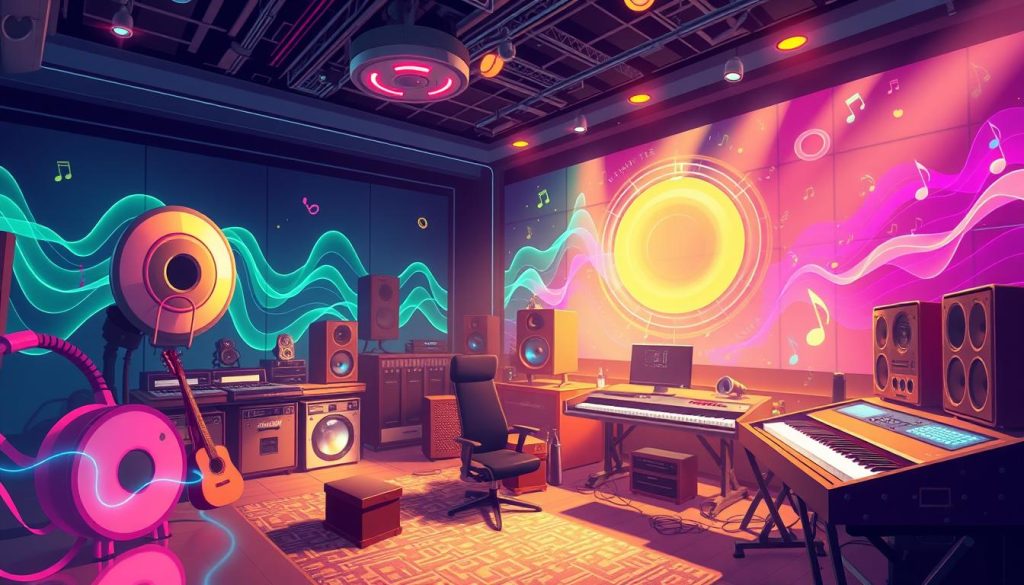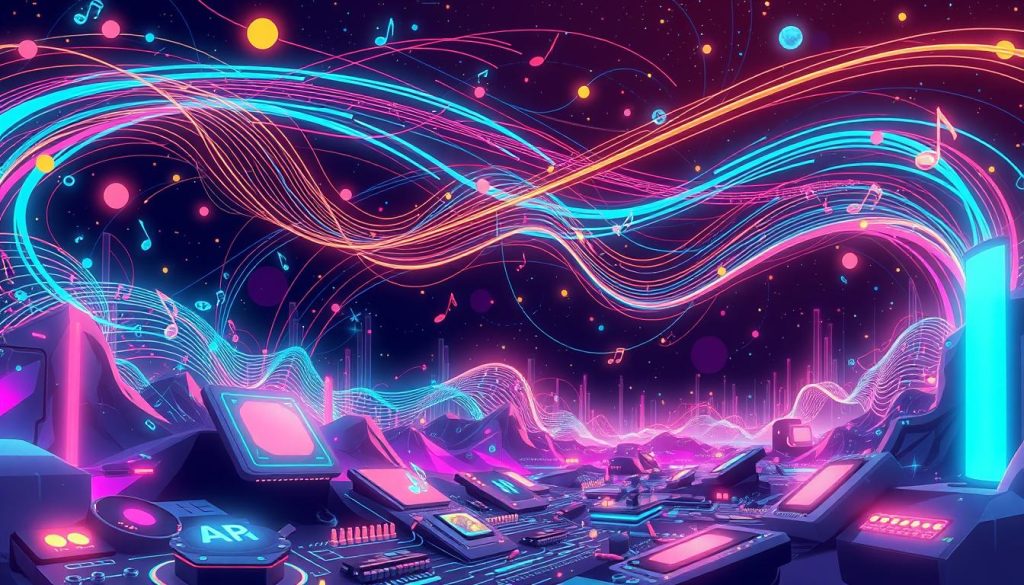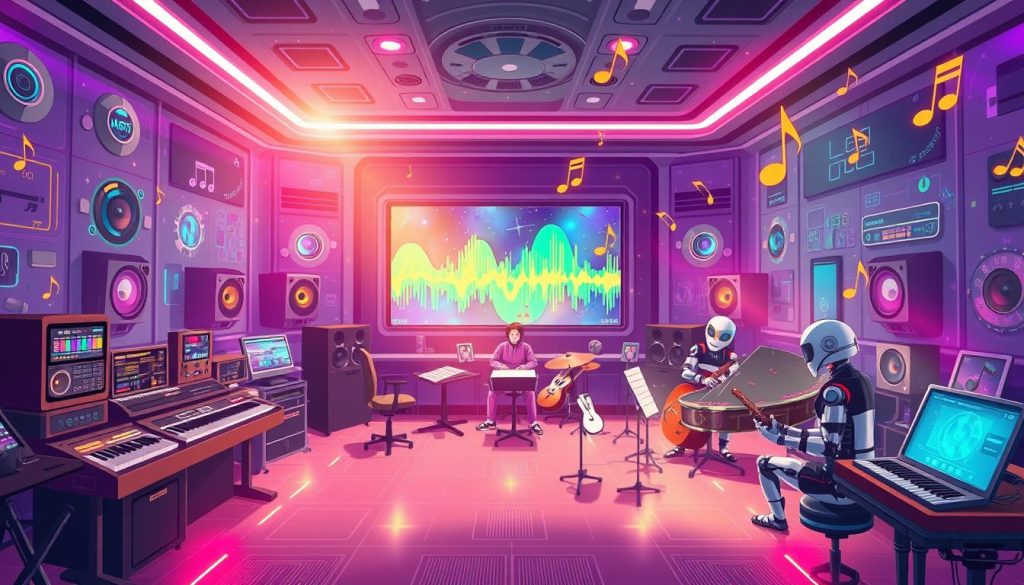Major music labels like Universal Music Group, Sony Music Entertainment, and EMI are showing a big hypocrisy. They are excited about AI music generation and have invested a lot in it1. But, they also go after people and platforms for music piracy23.
Key Takeaways
- Major music labels have invested in AI-powered music generation tools and platforms.
- These same labels have a history of pursuing legal action against individuals and platforms for alleged music piracy.
- The incident at the Sundance Film Festival, where a pirated NFL playoff game was played at a VEVO event, highlights the apparent hypocrisy in the labels’ approach to copyrights.
- The music industry’s selective enforcement of intellectual property rights raises questions about their true commitment to protecting creative content.
- The rise of AI music generation has the potential to disrupt the industry, challenging traditional business models and power structures.
The Controversy Surrounding AI Music Generation
The rise of AI music generation has sparked a heated debate in the music industry. Major record labels have invested in AI music tools4. Yet, they quickly criticize AI use, especially on copyright and ownership issues.
Record labels show a mixed view on AI music. They see its benefits, like the Music AI Incubator with Universal Music Group and YouTube4. But their actions seem hypocritical.
The Sundance Film Festival incident shows the labels’ double standard4. They embrace AI when it benefits them but limit it when it challenges their models.
The Hypocrisy in Their Approach to Copyrights
Record labels are strict on copyright, protecting their artists and property. But with AI music, their stance is contradictory4. They support AI tools but criticize AI use on copyright and ownership.
This hypocrisy has caused frustration and mistrust in the music community. The industry’s handling of AI will impact creativity and innovation45.
AI in music has come a long way, from simple experiments to advanced systems5. The industry’s response to AI will shape the music industry’s future and AI’s role in creativity.
The Rise of AI Music Generation
The music world is changing fast, thanks to AI music generation. Tools like AIVA and OpenAI’s MuseNet let both new and experienced musicians try out new sounds and styles.6 This has led to more AI music in movies, games, and ads.
AI is also changing how music is produced. Services like LANDR and CloudBounce help artists make their music sound better without spending a lot.6 Also, tools like iZotope’s Neutron use AI to help mix tracks, making music production easier.
AI is also affecting the music industry in other ways. Streaming services like Spotify use AI to suggest songs based on what you listen to.6 AI helps make marketing more precise, reaching the right people with the right music.
But AI raises important questions and concerns. There are worries about AI bias in music distribution and marketing.6 People are also concerned about AI replacing human musicians and industry workers.
The music industry’s future looks bright with AI. It’s important to make sure AI is fair and transparent, especially when choosing music for listeners.6 We can expect to see more advanced AI tools and marketing strategies in music.
How AI is Revolutionizing the Music Industry
20.3% of artists are already using AI for music production.7 About 60% of musicians use AI for melodies, beats, and lyrics.7 This shows AI’s big impact on music creation.
AI is changing the music industry in many ways. The music generation industry is set to reach $1.10 billion by 2027.7 The generative AI music market is growing fast, showing AI’s potential.
AI is also making music licensing easier and could increase revenue. AI in music business has the potential to boost income through smart strategies.7 As AI becomes more common, music creation and listening will change.
Popular AI Music Generation Tools and Platforms
- AIVA: An AI-powered music composer that can generate original compositions in various genres.
- OpenAI’s MuseNet: A deep neural network that can produce 4-minute musical compositions with multiple instruments.
- LANDR: An AI-powered mastering service that provides professional-quality audio mastering for music producers.
- CloudBounce: An AI-driven mastering platform that offers automated mastering solutions for artists and creators.
- iZotope’s Neutron: A music production suite that utilizes machine learning to assist engineers in mixing and balancing audio tracks.
“The rise of AI in music generation is a testament to the transformative power of technology in the creative arts. As we continue to push the boundaries of what’s possible, the future of music holds endless possibilities.”
AI Music Generation: Threat or Opportunity?
The music industry is facing a big change with AI music generation. Some see it as a chance to boost creativity and open new ways to make and share music. But others worry about job losses, the value of music, and artistic integrity.
AI is already helping musicians and producers with tasks like tuning and mastering. It’s also being used to create full songs without human help. This new way of making music has raised concerns about the rights of workers in the Global South who help train AI systems.
There’s a big debate about how AI music affects musicians’ jobs and income. As AI gets better, some fear it could replace human music makers. This has led to lawsuits over copyright and data use.
But AI also brings new chances for the music world. Just like the phonograph and MIDI changed music, AI tools like stem splitters and AI voices are making music production better. They open up new creative paths for artists.
As the debate goes on, it’s key for everyone involved to talk openly and work together. By seeing AI as a partner, the music industry can use its power to bring in new ideas and make music more accessible to all.
The Legal and Ethical Implications of AI Music
AI in music generation is growing fast, raising big legal and ethical questions. The music world must figure out copyright laws and who owns AI music. There’s debate on creators’ rights, artists’ use of tools, and what listeners get8.
People worry about AI’s effect on music’s soul and creativity. They fear AI music might replace human-made songs9.
Copyright Laws and AI-Generated Content
AI music rights are a big puzzle. As AI gets better at making music, who owns it is a big question9. Soundful, a top AI music platform, tries to solve this by not using copyrighted music. They let creators keep their music made with their tools8.
Preserving Artistic Integrity and Creativity
AI music raises questions about music’s soul and creativity9. AI tools make music easy and sound great, but might replace human songs. This could lose the special touch and feelings human artists bring9.
Soundful tries to keep music real by using many musical styles. They want to keep human creativity alive8.
The music world needs to work together to handle AI’s legal and ethical sides9. Finding a balance between new tech and keeping music true is key for music’s future.
Embracing AI Music Generation Responsibly
The music industry is diving into AI with both excitement and caution. It’s important for artists, creators, and the industry to use this technology wisely. They need to follow best practices that keep things transparent, protect artistic integrity, and respect copyrights10.
Best Practices for Artists and Creators
Artists and creators have a big role in using AI music responsibly. They should be open about using AI in their work. This way, fans know how technology helped create the music.
They also need to keep their unique style and vision alive. AI should not take over their creativity. Lastly, they must not use music or samples without permission, respecting others’ work11.
The Role of Record Labels and the Music Industry
Record labels and the music industry have a big part to play too. They need to set rules that protect artists and encourage new ideas. This means working together with artists, policymakers, and tech companies to find the right balance11.
By using AI wisely, the music world can grow and improve. It can offer new sounds, better experiences for fans, and more opportunities for everyone. All while keeping the focus on creativity and respecting others’ work10.
| Best Practices for Artists and Creators | The Role of Record Labels and the Music Industry |
|---|---|
|
|
“The focus is on developing new tools to enable creators to earn money on the platform even with the emergence of generative AI.” – YouTube CEO Neal Mohan
Conclusion
The rise of12 AI-powered music generation has changed the music world a lot. Big record labels have backed these new techs but also fight them on copyright13. This shows we need a smarter way to use AI in music.
Talking openly, setting good rules, and keeping music real can help. This way, the music world can grow with12 AI while solving legal and moral problems13. The future of music is bright with12 generative music AI13, machine learning music, and12 neural music generation.
As music changes, using12 AI music generation13, deep learning music synthesis, and14 AI-powered music composition wisely is key. We need to keep music creative, protect it, and make sure it feels real121314. By doing this, music can explore new areas with12 artificial intelligence music generation and become more exciting and fresh.
FAQ
What is the stance of major record labels on AI-generated music?
Can you provide an example of the hypocrisy in the major labels’ approach to copyrights and AI in music?
How is AI revolutionizing the music industry?
Is AI-powered music generation seen as a threat or an opportunity by the music industry?
What are the legal and ethical implications of AI-generated music?
How can the music industry embrace AI-powered music generation responsibly?
Source Links
- Google’s advanced music generation model and two new AI experiments
- The evolution of Steve Albini: ‘If the dumbest person is on your side, you’re on the wrong side’
- VEVO CEO Tries To Explain Their Hypocritical Act Of Piracy At Sundance | TechCrunch
- AI music isn’t going away. Here are 4 big questions about what’s next
- The Rise of AI-Generated Music: What It Means for Artists » Flourish$Prosper Music Group
- The Rise of AI in Music: How Technology is Shaping Industry Trends
- The Rise of AI in the Music Industry: Is it Taking Over? |
- Ethical Considerations on AI Music | Soundful
- Ethical Considerations in AI Music Creation
- YouTube touts AI principles to protect music creation
- AI Music: What Musicians Need to Know – Berklee Online Take Note
- The Impact of AI Music Generators on the Music Industry
- Impact of AI Music Generators on the Music Industry: What Does Science Say?
- Collaborating With AI Music Generation Platforms: A New Frontier In Songwriting



